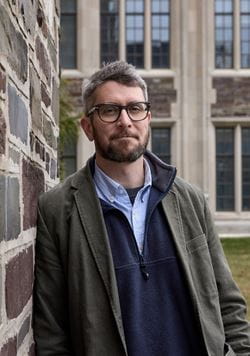
5/3/2023
PITTSBURGH — Clifford P. Brangwynne, Ph.D., a Princeton University researcher who launched the “biomolecular condensates” cell biology field, will receive the 2023 Dickson Prize in Medicine, the University of Pittsburgh School of Medicine’s highest honor.
The prize is awarded annually to an American biomedical researcher who has made significant, progressive contributions to medicine. The award consists of a specially commissioned medal, a $50,000 honorarium and an invitation to present a keynote lecture at the university, which Brangwynne will give on May 12.
“Cliff’s incredibly influential work has opened a new window into biology that could help us better understand diseases affected by changes in protein states, like Alzheimer’s,” said Anantha Shekhar, M.D., Ph.D., Pitt’s senior vice chancellor for the health sciences and John and Gertrude Petersen Dean of Medicine.
 Brangwynne, who directs the Princeton Bioengineering Initiative, created a new field in cell biology when he unified material sciences with biology. Phase transitions are a fundamental concept of matter. Water, for example, can transition from a liquid to a solid or gas. Yet, while biomolecules — like proteins — are themselves a type of matter, scientists previously did not know whether they also undergo similar phase transitions within living cells. Brangwynne and colleagues discovered that biomolecules in a cell can organize themselves into liquid-like droplets called biomolecular condensates. The formation of these condensates is akin to oil molecules creating droplets as they separate from water.
Brangwynne, who directs the Princeton Bioengineering Initiative, created a new field in cell biology when he unified material sciences with biology. Phase transitions are a fundamental concept of matter. Water, for example, can transition from a liquid to a solid or gas. Yet, while biomolecules — like proteins — are themselves a type of matter, scientists previously did not know whether they also undergo similar phase transitions within living cells. Brangwynne and colleagues discovered that biomolecules in a cell can organize themselves into liquid-like droplets called biomolecular condensates. The formation of these condensates is akin to oil molecules creating droplets as they separate from water.
He observed that these condensates act similarly to organelles, even though they lack the characteristic lipid bilayer membrane. Still, these “membrane-less” condensates maintain an inside and outside environmental boundary, with the inside setting the stage for various biochemical reactions and interactions. This observation showed that the physics responsible for material phase changes and the separation of oil and water also drive the dynamic changes in structure and biology occurring within a cell’s cytoplasm.
Alongside this discovery, Brangwynne and colleagues proposed and helped demonstrate that malfunctions in fusion and separation during phase transitions of these liquid-like condensates lead to the formation of solid structures. These solid structures resemble the tangles and fibers observed in neurological disorders, such as Alzheimer’s disease and amyotrophic lateral sclerosis. His recent studies have harnessed light-sensitive proteins to manipulate condensate dynamics to characterize pathological outcomes resulting from disruptions to their phase transitions. He and his team continue to develop tools to define the biophysical properties of condensates and explore the utility of this knowledge in biotechnology and medicine.
Brangwynne will accept the award during a research symposium sponsored by the Pitt and Carnegie Mellon University’s joint molecular biophysics and structural biology (MBSB) graduate program. The symposium will be held on Friday, May 12, in Pittsburgh and will include faculty, current graduate students and an alumnus from the MBSB program. Brangwynne will deliver the Dickson Prize in Medicine Lecture at 3 p.m. in the Frick Fine Arts Building auditorium.
“I am absolutely thrilled to be honored with the Dickson Prize in Medicine, with so many luminaries among the previous awardees. It is particularly gratifying to receive this recognition from the medical community, which I think is a testament to the translational impacts that fundamental research can ultimately have on society,” said Brangwynne, the June K. Wu ’92 Professor in Engineering and professor of chemical and biological engineering at Princeton. “I want to thank all the mentors, collaborators and trainees I’ve had the opportunity to work with, especially my Ph.D. advisor, Dave Weitz, and my postdoc advisor, Tony Hyman, who was a key partner in our early discoveries.”
Brangwynne earned his undergraduate degree in material science and engineering from Carnegie Mellon University in 2001 and his Ph.D. in applied physics from Harvard University in 2007. He then completed his postdoctoral training at the Max Planck Institute of Molecular Cell Biology and Genetics and the Max Planck Institute for the Physics of Complex Systems. Brangwynne joined the faculty at Princeton University in 2011, where he has an integrative research team with backgrounds in engineering, physics, molecular biology and chemistry.
Brangwynne has received many honors and awards, including a National Institutes of Health Director’s New Innovator Award (2012), Searle Scholar Award (2012), National Science Foundation CAREER Award (2013) and Sloan Research Fellowship (2014). In 2018, he became a Howard Hughes Medical Institute investigator and a MacArthur Fellow. The following year, he was named director of the newly formed Princeton Bioengineering Initiative, which brings together more than 30 principal investigators to develop tools and technologies that will enable scientists to interface with living matter at every scale. He received the Blavatnik National Award in Life Sciences, followed by the Tsuneko and Reiji Okazaki Award in 2021. Brangwynne continues to receive recognition for his contributions to the study of living cells and has recently received the 2023 Sackler Prize in Biophysics and the 2023 Breakthrough Prize for the Life Sciences.
PHOTO DETAILS: (click image for high-res version)
CREDIT: Princeton University
CAPTION: Clifford P. Brangwynne
















